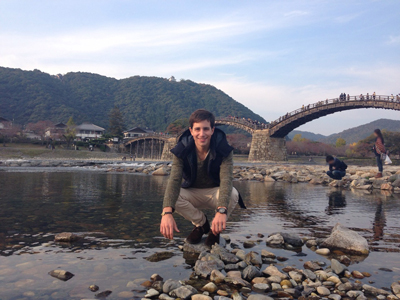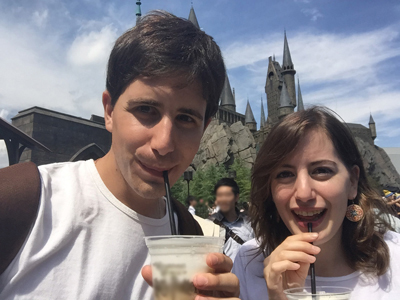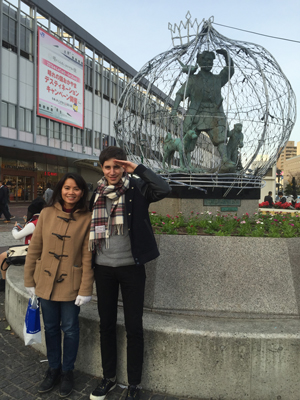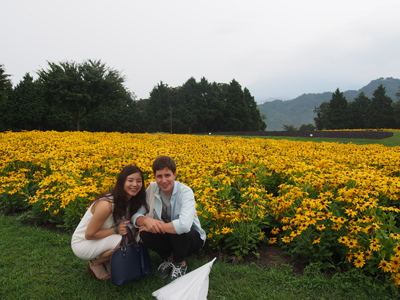“It is the worries and pains we experience that add depth to our lives”

Name: Damaso Ferreiro Posse
Home Country/Region: Spain
Affiliation: Comparative Studies of Japanese Culture Course, Graduate School of Letters
Hobbies: Reading, running, travelling, eating out and making sweets
(Date of Interview: January 25, 2016)
Tell us about your hometown.
I am from Santiago de Compostela, the capital of the autonomous community of Galicia, located in northwestern Spain. Being the destination of the most popular Catholic pilgrimage route in Europe, it has many churches and cathedrals attracting tourists from all over the world. I would say that it is a city that symbolizes all of Spain.
When we speak of Spain, I think most Japanese will think of flamenco or bullfighting rather than something such as religious pilgrimage. But my hometown is totally different in all aspects. In Spain, the differences between regions are significant; those in the north, central, and south each have their own unique cultural roots. The northern part of my hometown, for example, is very much influenced by Celtic culture, making it quite similar to the United Kingdom. There are people who dance UK style dances in ankle-length long skirts, and the bagpipe is our traditional musical instrument. So, bullfighting and flamenco are quite foreign for me. As for food, my city is famous for its milk and seafood, just like Hokkaido in Japan. Being home to the renowned University of Santiago de Compostela, established in the 15th century, is also one of the things we are proud of.
Talking about Spain, you gave a presentation on your country at “Experience Teatime Around the World in the Faculty of Letters” last year on Hiroshima University’s Homecoming Day, right?
Yes, I did. I introduced the typical tea and snack in Spain, marzipan and chamomile tea with honey. Both may be too sweet for Japanese tastes. But in Spain, we usually drink chamomile tea with honey when we are not feeling well. Another common snack in Spain is “polvoron”. It is a kind of shortbread made of almond that we usually eat during Christmas. It is commonly found in shops, too, but my mother usually makes it herself at home. Since I couldn’t have my mother’s homemade polvoron last year, I tried making it for the first time myself. Somehow I managed to do a decent job of it, but it does not live up to my mother’s.
So, you like to bake, right?
I have been trying to bake many kinds of cakes and cookies lately, but many haven’t turned out well (laughter). Besides that, I often make paella and other Spanish dishes, too. But the ingredients I am able to acquire in Japan are limited, so it is difficult to reproduce the original Spanish taste. For example, I use a hotplate to make paella, which requires rice, but Japanese rice always seems to turn out hard and dry. The taste is acceptable, but somehow the texture is not satisfactory. Another thing is cheese; unfortunately I haven’t been able to find any in Japan that I like. There are many kinds of cheese in Spain. Strong cheese, mild cheese, and cheese made using milk not only from cows and sheep but also goats. We often choose our cheeses according to our mood in the moment. I really do miss the cheese in Spain.
By the way, what were you studying at your university back in Spain?
I studied ancient Greek literature and Japanese. For example, “Oedipus the King“ (Oedipus Rex) is a world-famous Greek tragedy, and I have been attracted to such literature since childhood. I started seriously studying Greek literature since high school and continued doing so after entering university.

How was student life in Spain?
It was quite tough actually. Unlike Japan, it is probably easier to enter into university, but we have to study very hard to graduate. Actually, many students drop out because they aren’t able to keep up with their studies. On the other hand, of the international students from Japan that I have met in Spain, most are on short-term exchanges that last only six months to one year. Given that these exchanges are oftentimes separate from their studies at their home universities, I see many of them rejoicing in their freedom. Some even spend day in, day out enjoying such freedom (laughter). Well, it’s understandable. Before I came to Hiroshima University, I was on a short-term exchange program at another university in Japan, and at that point I also had been prioritizing play over study (laughter).
Why did you choose to study in Japan?
While I was an undergraduate student in Spain, I had always wanted to further my studies by going to a university abroad. I had considered other countries as well, but since I was quite struck by Japanese literature and language, I chose to come here.
So, that is why you came to Hiroshima University as a research student?
That’s right. I started as a research student. At that time, I was studying modern and contemporary Japanese literature among other Japanese students. I felt very out-of-place as I was the only foreigner in the class at the time, and I was having doubts as to whether I should continue studying. I felt insecure, thinking that it would be impossible to match up to the other Japanese students. But, the truth is, we, the foreigners, can see things from a different perspective. I have come to learn that being a foreigner does not put me at a disadvantage in comparison to Japanese students, but rather allows me to study Japanese literature in a different light. I know this now, but I was not as confident back then. Anyway, I worked hard in preparation for the graduate school entrance examination while continuing my studies as a research student. Along with frequently consulting with my academic advisor, I did research on the entrance examinations, and its past structures and trends, at the library. And after doing my best to study my own research theme, it came time to take the examination. It was quite difficult.
I passed the exam and officially became a graduate student. However, there were many things that were difficult for me to follow and keep up with. As I mentioned earlier, this was not my first time studying at a university in Japan, but it was my first time being a full-fledged university student in Japan. At first, I didn’t know how to tackle tasks or to perform research in Japan. I didn’t even know the difference between graduate and undergraduate students in Japan, and I wasn’t aware of the existence of the difference at the first place.
Could you tell us more specifically about what kind of difficulties you faced?
Well, for example, the way in which to write a paper, or rather, the structures of a report, are different between Japan and Spain. Besides that, as an undergraduate student, you could hand in papers which were “just acceptable” and not have to worry. But “just acceptable” is no longer acceptable after entering graduate school. In order to pass, the papers must be written sufficiently and meet all requirements. It also took me some time to get used to Japan’s unique terminology.
Relationships between professors and students are also very different in Japan compared to Spain. In Spain, and I should add that I am not trying to generalize or talk about all universities, students seldom have the opportunity to speak with their professors individually or ask them questions. Therefore, when I first came to Hiroshima University, I didn’t know how to “relate” with my professors. I tried to speak with them in awe and reverence, and using much caution. Gradually, though, I got used to less “stiff” exchanges, and managed to form good relationships with my professors. Having overcome these difficulties, I managed to get the balls rolling for my life as a graduate student little by little.

So, you are studying modern Japanese literature at Hiroshima University. Could you tell us more about what fascinates you to this subject?
What fascinates me? This is the first time someone has asked me that question (laughter). I feel that the modern Japanese literature has a kind of depth not often found in the other contemporary literatures. The works of modern Japanese literature are produced by writers who are interested in Western literature but who have also studied Japanese literature. Their works are thus based on their knowledge of both literatures. Ryunosuke Akutagawa, Soseki Natsume, Ougai Mori are some such examples, whose works are influenced to some extent by the Western literature. Chinese poetry has also served as a source of inspiration for many Japanese writers of modern literature, so in one literary work it is possible to perceive various different cultural sources of inspiration. I think that this is one of the most fascinating things about modern Japanese literature, and that this is what makes it so unique.
I see. And how would you evaluate Japanese students at Hiroshima University?
I think there are many diligent students at Hiroshima University, and I am very glad about that. Well, you see, in my previous university in Japan, most of the students I met were fond of anything and everything besides studying, and so I couldn’t help but to join them in their fun (laughter). In this sense, Hiroshima University provides a perfect environment to motivate me to work my hardest because of the diligent students around me. My Japanese friends at Hiroshima University welcomed me with an open-heart from the beginning and treated me kindly. I am really grateful for that.
Many Japanese students work at part-time jobs. What about you?
I have a part-time job, too. I am teaching English to children at a school nearby. Of course, my studies are my priority. But that doesn’t mean I have to shut myself up and study from morning to night in the lab. I think keeping in touch with the outside world helps one to mature as a person, and so I try my best to grab all opportunities I can to keep abreast with local society and events. I think the best way to do so is to at least work a little on the side. At the school in which I am teaching, we are not allowed to speak in Japanese. Teachers and children communicate in English only. It is not an easy job, but I enjoy it very much. My ambition is to become a university professor, and this job is useful as it provides me with teaching experience. I hope to gain more and more experiences such as this.
What do you think about the lectures at Hiroshima University?
I think students’ freedom is very much respected here. Each student is free to do their research and give their presentations on topics that are chosen individually. Unlike in Spain, because the relationships between students and professors are so close here in Hiroshima University, students can consult with their professors easily. This is something I am thankful for. Speaking of this, I remember a specific time when I had consulted my professor about something that was worrying me. Although it is natural that I might have felt this way, I was worried that my own identity, as that of a foreigner, would prohibit me from being able to read the works of Japanese literature with the same eye and understanding as that of other Japanese students. My professor advised me conversely, convincing me that having a foreigner’s perspective is rare and valuable. He encouraged me not to worry, and that I should continue looking at literary works from my own unique perspective.
That sure is very encouraging advice. By the way, what do you do during your free time?
Have fun with my friends, for sure! To me, time spent with friends is very precious. I usually like to go to “nabe” (hot-pot) parties with my Japanese friends. With other friends, we usually go to Hiroshima city. And I go travelling a lot, too. I’ve been to Izumo Taisha (Izumo Grand Shrine), Tamatsukuri Onsen (Hot Spring), etc. I was bewildered when I went to a hot spring for the first time, but now I am used to it. I always seem to have interesting experiences when going. People will glance at me, and older men will approach me and speak to me in English. “Can you speak Japanese?”, “Oh, you came from Spain! Wow! Wonderful, tell me something about Spain” (laughter). It truly is quite entertaining.

What are your goals you would like to achieve while studying abroad?
The reason I came to Japan is to try things that can only be experienced here, and to develop and mature while doing so. As you know, we, the people of Europe, have the mentality of “Europe has the best of everything”. But I don’t necessarily think so. I think Europe has plenty of room for improvement. But we don’t realize that unless look back at our own countries after having gone abroad. There are many things I have realized about Spain only after coming to Japan. And since being in Japan is a once in a lifetime opportunity, I would like to take this time to grow and improve as a person, making the most out of my characteristics and experiences as a Spanish person living in a different culture. I believe that by doing so, I can figure out where Spain should be heading to in future and how it should do so. I suppose many of you know that there are many Spanish citizens who are economically disadvantaged and that the government is not handling this problem sufficiently. I think it is our responsibility, as the younger generation, to change this situation for the better. I hope that through my experiences in Japan, I will develop the skills to do something useful for Spain.
That is brilliant! By the way, what are some of the things you have realized after coming to Japan? Can you name a few?
“When you smile at someone, that person will smile too”. This may be common knowledge in Japan, but it is something I only realized after leaving Spain. In Spain, salespersons for example do not smile or speak politely. They use casual language when speaking to their customers. Even when the customer approaches them politely saying “excuse me”, the salesperson will answer casually, or even with some annoyance, saying something like, “yeah, yeah, what is it?”. In fact, I have never been happy with such attitudes even while in Spain. I think customers should be treated more politely, and I realized that this was not just wishful thinking of mine once coming to Japan and observing for the first time how Japanese salespersons treat their customers with friendly faces and kind hearts.
What kind of advice do you have for Japanese students planning to further their studies by travelling and studying abroad in Spain or other European countries?
I would advise Japanese students to go to Europe with a blank mind. Do not worry about not having language ability or other slight things. Just be mentally prepared and open minded. Japanese people often worry about what other people will say about them, but actually most Western people don’t care at all. So, I hope all those who are planning to go abroad will just take things easy and not worry too much. Going abroad is a big step toward your future. So I hope everyone will be able to become more carefree and adapt to their new lives comfortably. I have some bad news, though: Japanese restaurants in Spain are not very good. Japanese condiments are also not readily available (except for soy sauce). So, I would recommend that you bring your own ingredients.
I have the totally opposite advice to my fellow European friends who are in, or will be coming to, Japan. In Japan, every action should be neat and precise. Although such behavior and protocol may be obvious for a Japanese person, it is not an easy task for us Europeans to learn what counts as “neat” and what counts as “precise” in Japan.
Thank you very much. Do you have any final words or thoughts to add?
Well, then, I would like to talk about my favorite writer, (Ryunosuke) Akutagawa. I think Akutagawa is a writer who cherishes his readers. He doesn’t just provide stories for his readers to glaze over, but instead provokes deep thoughts, and questions, that readers will carry with them long afterwards. His works may be short, but are certainly thought-provoking. After closing the book, I spend a long time just sitting there and thinking about his words and his messages. These are not words that one can just read and put away. These are words with deep messages, embedded deep inside for the reader to discover. For example, “Mensura Zoili”, a mysterious story based on the Roman classic, sure had left his readers thinking. The same goes for “Rashomon”. Readers couldn’t help but wonder what happened to the main character after the story’s end.
Despite his short life, Akutagawa has left behind many mysteries that continue to provoke and fascinate his readers. The depth of his works is the reflection of the many agonies and pains he had experienced during his life. I think it is the same for us, too. It is the worries and pains we experience that add depth to our lives. It is also this that makes our lives wonderful. I sure think so, at least.

Photo Gallery

The Kintaikyo Bridge (Yamaguchi Pref.)

Riding attractions at a theme park with my sister (Osaka Pref.)

My schoolmate and I in front of the Momotaro statue near the JR Okayama Station (Okayama Pref.)

My Japanese friend and I viewing flowers at the Tottori Hanakairo Flower Park (Tottori Pref.)


 Home
Home